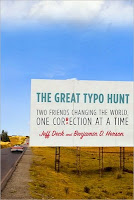Summary: Feeling purposeless as a copy editor at small magazines, Jeff decides to set out on a mission. With his friend Benjamin, Jeff will drive around the country, correcting grammar and spelling errors in public signs (no more its/it's confusion! wrongly placed apostrophes! misspelled words!). Along the way, Jeff struggles to define the purpose of his mission in a world of typos.
Purpose: The basic mission of Jeff, Benjamin, and TEAL (Typo Eradication Advancement League) is one I can support. After all, I teach grammar, value its importance, and am also rankled by blatant and lazy errors. One that still gets me is on the back of a fencing t-shirt I have, which proudly claims, "Fencing in Tennessee ain't what it use to be." Plus, the boys' mission sounds like a lot of fun. The two drove around the country, fixing errors (with the aid of Wite-Out, markers, tape, and chalk), sometimes with the owners' approval and sometimes surreptitiously.
But, right away, TEAL and the reader trying to sympathize come up against a problem. We may value correct grammar, but it's difficult to go around correcting people's signs without coming off as a holier-than-thou curmudgeon out to disparage the less educated. To his credit, Jeff recognizes this, but he also struggles to articulate his mission in a way that is meaningful, fair-minded, and defensible. In fact, much of the first part of the book is concerned more with Jeff's examination of his purpose than anything else, and although many books concern man's search for life's meaning, it's hard to care much about Jeff's uncertainty.
The book also has difficulty finding a proper tone. It tries to take on a mock-grandiose style, what Jeff calls "self-parodying pomposity," (139) using hyperbolic terms as a way to sound both important and like it doesn't take itself too seriously. Even the structure of the book follows suit, as headings at the beginning of each chapter relate the events in terms of the epic hero cycle. But, again, it is difficult to use that kind of language to describe your mission while also being sincere and not "being jive-ass punks" (172).
Furthermore, although it seems like TEAL's roadtrip would be ripe for great stories (both funny and horrifying), most of Jeff and Benjamin's encounters in fixing errors are pretty dull. There are some interesting musings about the structure of the employer-employee relationship in retail stores, where the team confronts sales associates who refuse to make any real decisions. The funniest meetings come towards and end of the book, where Jeff and Benjamin meet people absolutely unwilling to acknowledge their errors. Ah, willful ignorance.
In an interesting turn of events, the trip ends in grand fashion when Jeff and Benjamin find themselves brought to federal court where they plead guilty and are heavily fined for "defacing" a "historic" sign at the Grand Canyon (they corrected a comma and apostrophe error). Reading about their trials through the bureaucracy that is the America judicial system rather made me hate my country and the stupid stuff the government is wasting its time on. To the federal officers who felt prosecuting that case was a worthwhile use of my taxpayer money: you're giant losers.
Of course, Jeff and Benjamin aren't necessarily the tiny underdogs out against the Man, which is how they most often present themselves. They're two white boys from Dartmouth who not only have the free time and money (though they do do the trip on the cheap) to take such a trip, but they're also rewarded with publicity (national news) along the way and obviously, in the end, a book deal. This type of book (a person chooses an odd, obsessive mission to complete in a set period and then blogs about it) is also pretty common today, so it's clear Jeff's mission was not terribly altruistic from the beginning.
In looking for implementable actions that can lead to less errors like the type TEAL found, Jeff and Benjamin do make an interesting point. Although students learn spelling throughout school, they do so by memorizing the spelling of specific lists of words. They never learn how to spell. I certainly don't know the rules for when double letters are or aren't used, for example. In seeing the dismal spelling of my 9th grade students, I think directly instructing students on how to spell could be worthwhile.
The Great Typo Hunt was less engrossing than I had hoped, but it opened up more questions for me than I had imagined. It led me to consider the ways in which we advocate for the proper usage of grammar in a world of so many problems.

No comments:
Post a Comment